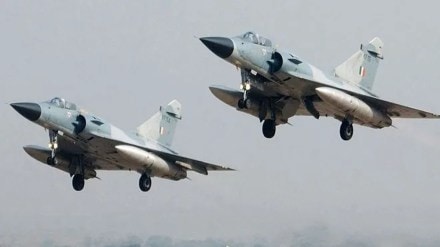New Delhi, Mumbai, Dec 30
In line with Prime Minister Narendra Modi’s commitment to attain net-zero emissions by 2070, Indian Air Force (IAF) has started adopting new technologies to cut carbon emissions.
The IAF had steered the Bio-Jet Fuel project as a Technology Demonstration to reduce the carbon footprint in the aviation sector. And its endeavour is to increasingly fly as many of its aerial platforms on the blended Bio-Jet Fuel. “Ground trials are likely to commence soon for the Dornier aircraft. Feasibility studies are also underway for the same on fighter aircraft,” a senior IAF confirmed to Financial Express Online.
Globally, in the aviation sector — both military and commercial — is a major source of carbon emissions. And countries worldwide are looking at green options to cut these emissions down. India too is focusing on sustainable fuel and is part of several groupings and consultations which work on green fuel.
IAF & Green Fuel
“Following successful trials on the AN-32 aircraft, airworthiness certification by the Centre for Military Airworthiness & Certification (CEMILAC) was given to the IAF last November. This was for the Bio-Jet blend in the ratio of 10:90,” the officer quoted above said.
As has been reported earlier, the Bio-Jet Fuel cleared for aviation by CEMILAC is produced and supplied by the Council for Scientific & Industrial Research Indian Institute of Petroleum, Dehradun. The Bio-Jet Fuel is of hydrocarbon type, produced by the conversion of lipids through a single step catalytic hydro processed esters and fatty acids.
And the IAF is presently sourcing Bio-Jet Fuel from CSIR, IIP only. It is understood that MRPL, Mangalore is in process of setting up a production plant with ToT from CSIR, IIP Dehradun.
A
Can this be scaled up?
To cut down the carbon emissions for the Indian aviation industry, as reported earlier that Sustainable Air Fuel (SAF) can play a huge role; however, its large scale production is marred with challenges.
Global Trend
The US Air Force is expected to adopt carbon free fuel. In 2021, e-Aviation fuel according to reports has been developed by `Twelve’ a company which is into carbon transformation. The research for this fossil-free jet fuel was funded by the USAF. And this fuel is good for military and commercial aircraft.
The US based Twelve in collaboration with Emerging Fuels Technology has developed a fossil-free fuel. And in place of petrochemical-based alternatives this fuel can be used and there is no requirement of changing the design of the plane or commercial laws.
Royal Air Force (UK RAF)
It plans to achieve net-zero emissions by 2040. In 2021 it announced about accomplishing the world’s first flight on 100 percent synthetic fuel. This fuel has been developed in collaboration with Zero Petroleum, a commercial partner. And later in this decade, it is working towards replacing the petroleum based fuels.
Brazil
The South American nation has passed legislation for biofuel. This legislation however is focused on commercial aviation. In 2021 under a new law the National Bio-kerosene Program went into effect and the goal of this programme is to urge the commercial aviation sector to adopt SAF.
What is Bio-kerosene?
It is a biofuel and can be used in place of aviation kerosene and is known by the acronym QAV-1. Made from municipal trash, and other biofuels like animal fats, vegetable oils like soy, it is renewable and it also minimizes pollution emitted by aircraft.
China
World’s largest polluters, it has also joined the bandwagon but only in the commercial sector. In 2019, China Southern Airlines announced the use of aviation biofuel and completed its first transcontinental flight.
According to reports, scientists in Switzerland have developed a way to make carbon-neutral jet fuel and they have used air and sunlight. This is expected to be used for hard-to-electrify heavy transport.
Russia has already forged partnership to develop biofuel – Airbus, Gazprom Neft, and Aeroflot, have together formed the first association of developers and producers of SAF in that country. And the plan is to have the first flight on such a fuel take off in 2024.
